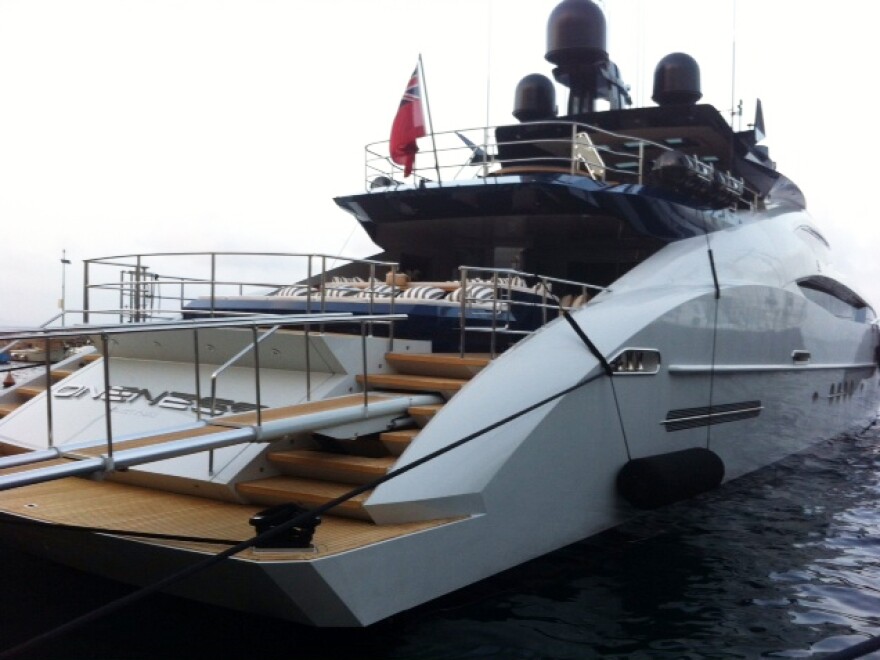Italy has a public debt of nearly 2 trillion euros, and it's cracking down on its notoriously wily tax evaders. Owners of luxury yachts are a prime target, with tax police launching dockside raids to see how individual tax files line up with owning and maintaining an expensive boat.
But yachts are mobile assets. In response, many boat owners are simply weighing anchor and setting course for more tax-friendly Mediterranean marinas.
On-the-spot tax inspections began last winter in Cortina d'Ampezzo, the trendy ski resort where many owners of Ferraris, Maseratis and Lamborghinis declared incomes of less than $30,000 a year.
It's summer now, and time to hunt down yacht owners. Tax police arrive dockside unannounced, board boats and check owners' details against their tax files. The raids have sent shock waves through the yachting community.
Cala Galera is a large private marina on the Tuscan coast with close to 1,000 berths.
"Clearly and definitely we at the moment are down with respect to other years," says marina director Pietro Capitani.
He points to the vast expanse of empty berths, and then makes a shooting gesture to his temple.
"We are at moment almost 40 percent less than last year. So, we are close to the [bang] for sure, for sure," he says.
A Huge Exodus
Since the tax crackdown was announced in March, around 30,000 boats have fled Italy, seeking safer havens. They include Slovenia, Croatia and Montenegro to the east, France and Spain to the west, and Tunisia and Malta to the south.

The Italian association of marinas says the yacht exodus has cost the Italian economy some $350 million this year in lost revenues from marina fees and services, and fuel sales.
Tax authorities are unrepentant, saying it's important to strike fear in the hears of tax dodgers. Italy has a long history of tax evasion and it is estimated to cost the government some $160 billion a year in lost revenue.
A few miles from Cala Galera, Porto Santo Stefano was once a favorite stop for luxury yachts cruising the clear turquoise waters of the Tuscan marine sanctuary.
Fashion designer Valentino's yacht was once a constant presence, as were the megaboats of Italian jet-setters. Today, it's as empty as the Cala Galera marina.
A Blow To Local Businesses
At a waterfront sail-repair shop, Paola Valenti has little to do.
"There are less than half the boats there were last year," he says. "Boats used to have to drop anchor and wait off shore for a berth to open up. This year, nothing, nothing, nothing."
One of the first boat tax raids took place in April in the southern port of Bari. There, tax inspectors found yachts owned by people who declared almost no income.
One of the most brazen cases was a yacht worth $1.5 million whose owner had never filed a tax return.
Despite her diminished income, Valenti has little sympathy for tax-dodging yacht owners. "If you own a boat," she says, "you have to have a certain declared income. You can't earn less than the sailor who works for you."
At the nearby Enoteca del Molo, an elegant wine bar and restaurant, owner Stefano Guerrini is resigned to the fact that the season has been a total loss. After many years catering to the wealthy yachting crowd, the economic crisis is causing pain, and he's closing shop.
"I am moving to other places in the world — Asia market, Africa. I don't want to stay here," he says.
It's nighttime, and the parish priest leads a procession for the patron saint, St. Stephen. At sea, local residents have decked out their little boats and fishing vessels with lights. But there is little sense of celebration.
In the darkness, a crescendo of foghorns sounds like a lament for the uncertain future of this yacht haven.
Copyright 2020 NPR. To see more, visit https://www.npr.org. 9(MDAwMzY5MzE4MDEzMTE3ODg5NDA4ZjRiNg004))



